Do developers want to work in startups and be their founders - infographics on the results of the survey
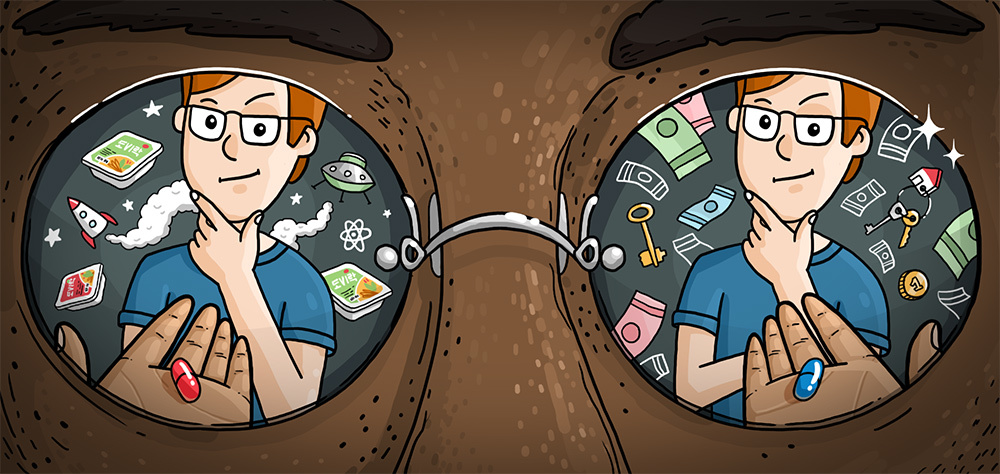
This time, “My Circle” together with Cofoundit tried to find out how developers are involved in startups: both from the perspective of an employee and from the position of the company's founder. We surveyed more than 3,500 people of My Circle and Habrahabra users. More than 90% of respondents have their account on "My Circle" - these are the IT specialists who respond to vacancies or post them on our service.
First, we learn a little about the industry as a whole: who works where, how much he earns, what he does, who has experience of an employee, and who - the founder of a startup. Then we ask to recall the most interesting startup in which it was possible to participate and compare the experience of employees and creators of startups, we also learn from them about their experience in investing and monetizing. Finally, we find out from those who have not yet had experience of a startup, what motivates them, and what stops them from acquiring such an experience.
')
The report was quite large, but, in our opinion, extremely interesting and informative. Boring numbers decorated cute infographics.
1. The IT industry as a whole and the first startup experience
From this set of questions, we found that men aged 25 to 33 years still dominate the IT industry, the majority with higher technical education, working in small or large private companies with salaries ranging from 40 to 120 thousand rubles.
Two out of five have experience working as a startup employee, and one out of four has experience creating their own startup. Most of this experience is associated with one or two startups in the field of business solutions. As a rule, the first experience of a startup happens at the age of 21 to 28 years.
How old are you and what is your gender?
The IT industry is male work: among IT professionals, there is only one woman for nine men. The average age of a specialist is 28 years (median). Half of the specialists are between the ages of 25 and 33 (lower and upper quartiles). A quarter older, a quarter under this range.

In what area is your education and what level?
The vast majority of our respondents (86%) have higher education. Of these, a small part of incomplete higher education, and there are also those who have a few higher ones. The majority indicated that they have the education of a programmer (60%) or an engineer (33%), also quite a few mathematicians (14%) and economists (9%).
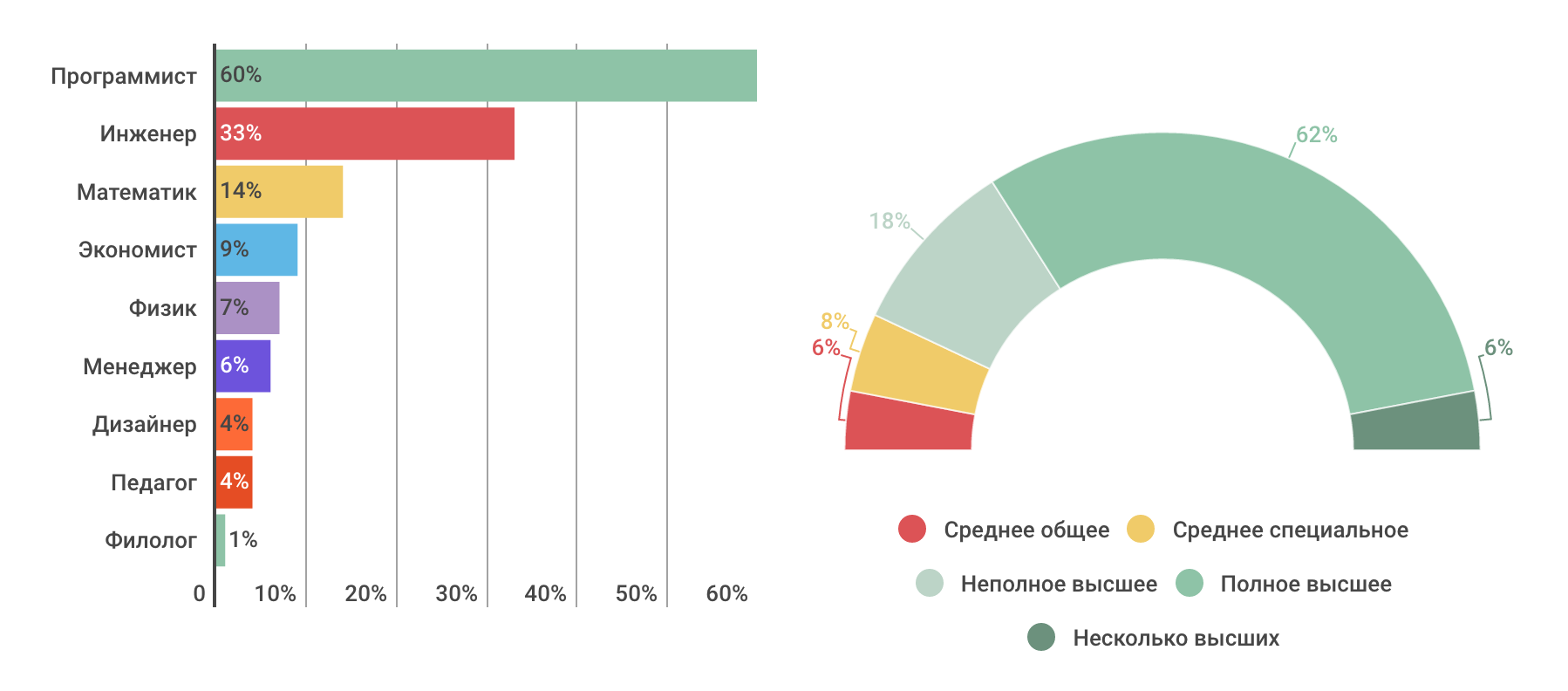
What IT field are you currently working in?
Among men, compared with women, there are more than 3 times more backenders, 2 times more mobile developers, and one and a half times more software developers. But among women, there are almost 4 times more designers, marketers, salespeople and content managers, almost 3 times more testers, and a half times more managers. Equal share among men and women is occupied by front-ends and administrators.
Thus, it can be said that men are more engaged in production, and women - in communication with the end user.

What type of company do you currently work for and how much do you earn per month?
Every third IT specialist works in a small private company, every fifth in a large private company. Least of all IT professionals involved in the public sector, there are only every sixteenth. Every tenth person is involved in startups.
The ratio of incomes of the highest paid IT professionals to the least paid ones, that is, the decile coefficient, is approximately 8. This is almost 2 times less than the same ratio throughout Russia, which at the end of 2015 was 15.6 according to the Federal State Statistics Service ( http://cbsd.gks.ru/ ).
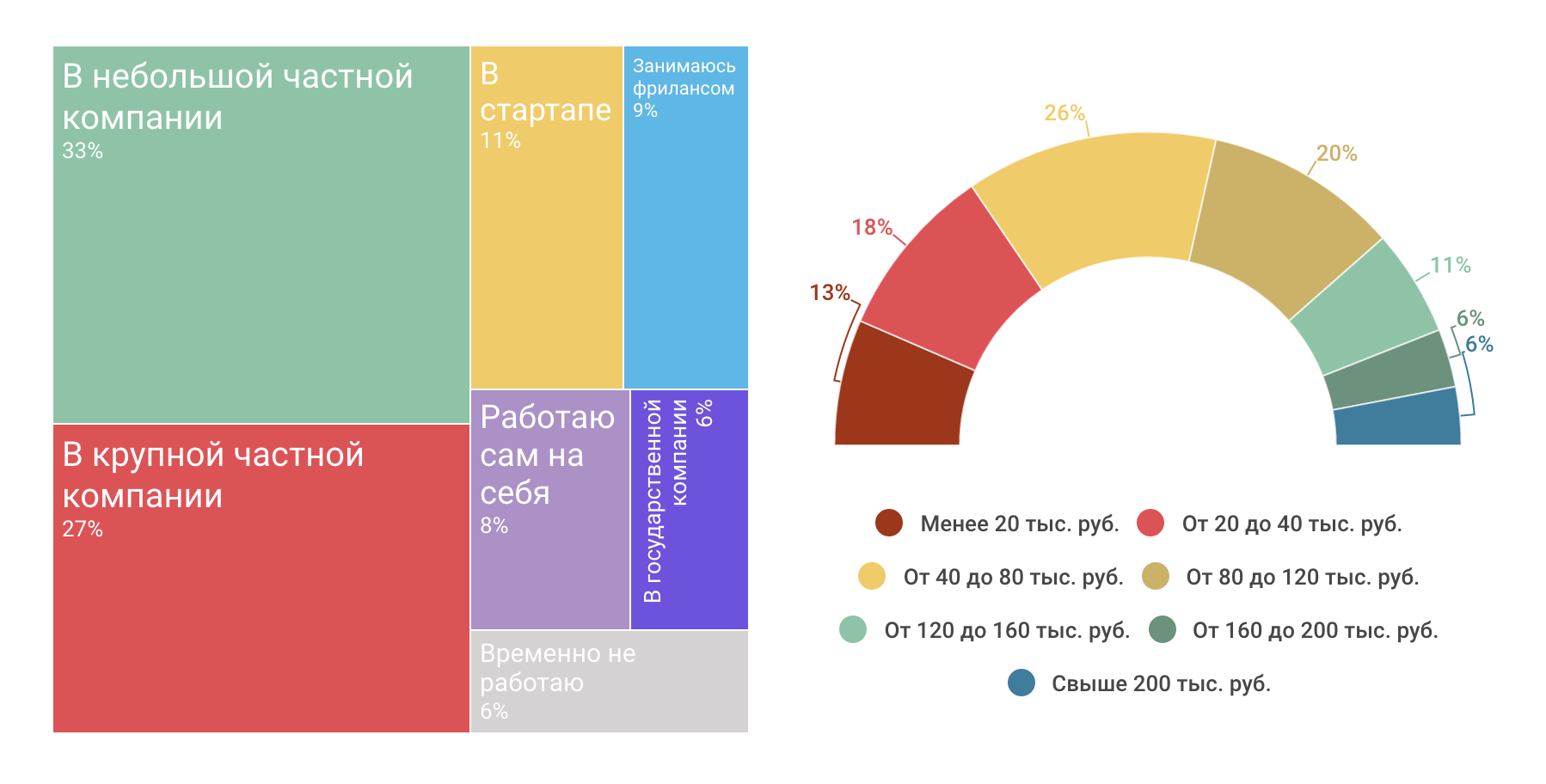
It is interesting to see how wages are distributed depending on the type of company. It immediately catches the eye that the distribution of wages in a startup most of all resembles a similar distribution in a large company. At the same time, in a start-up, compared to a large company, the share of those who receive the highest salaries is slightly larger, and the share of those who receive the lowest salaries is much larger.
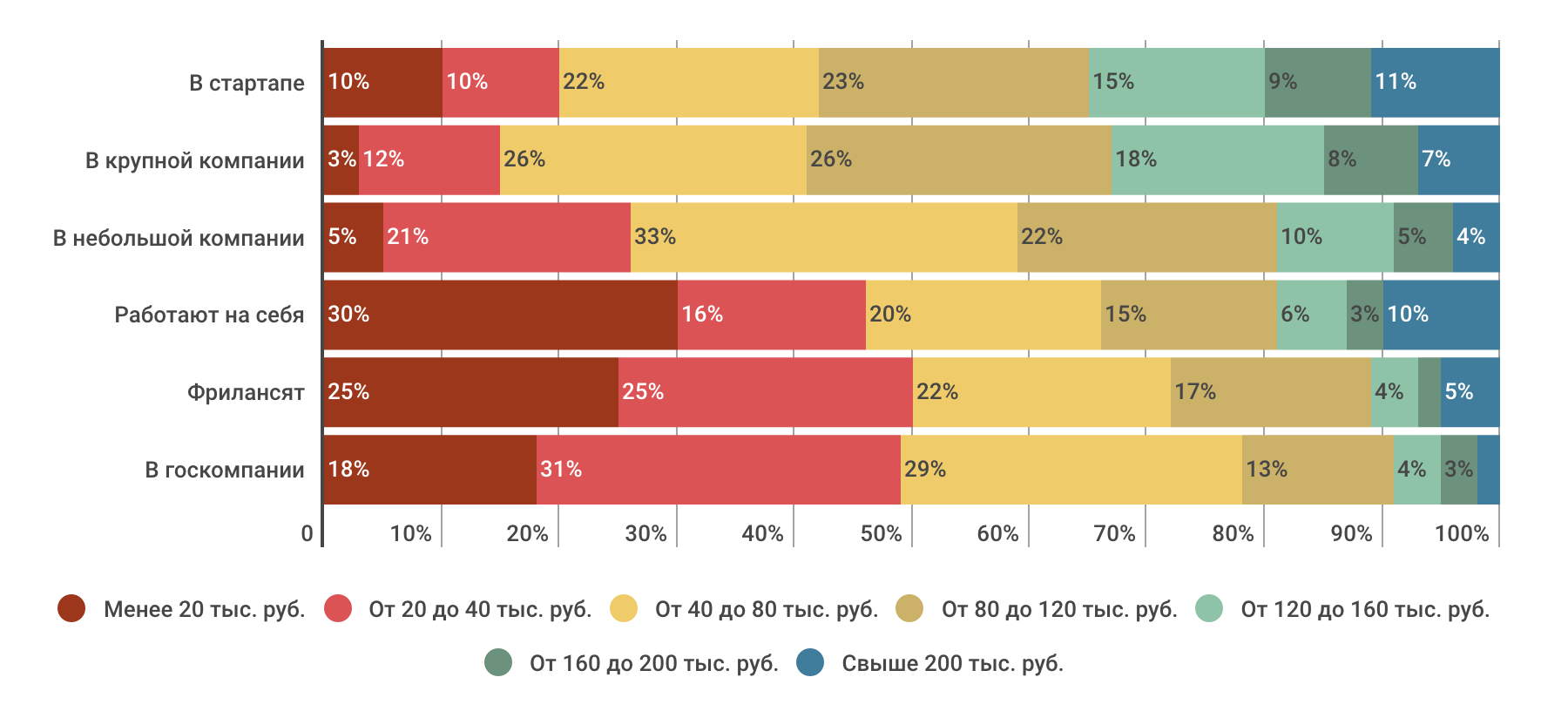
Do you have experience in startups as a hired employee, and do you have experience in creating your own startup?
Experience in startups, as employees, is the same for men and women working in the field of IT: both of them indicated that two out of five had such experience. But the experience of creating their own startups for men was more - every fourth man and every sixth woman has such experience.

More often in startup companies, HR managers and managers work as employees - more than half of the specialists in these fields of activity indicated that they possess such experience. The developers of the backend and mobile applications also work more often than others in startups - almost every second of them said this. Less often, salespeople work in startups, only one in five said so. Also, administrators and software developers work less often than others in startups, every third person among them said about it.
Start-ups are more often created by managers - almost every second of them indicated such an experience. Content workers, analysts, and marketers are also more likely to create startups, about one in three of them are talking about this. Rarely all startups create Eychary - only every twelfth speaks about it. Also, less frequently than other startups are testers - only every tenth, among front-line vendors and administrators, only one out of five announced such experience.
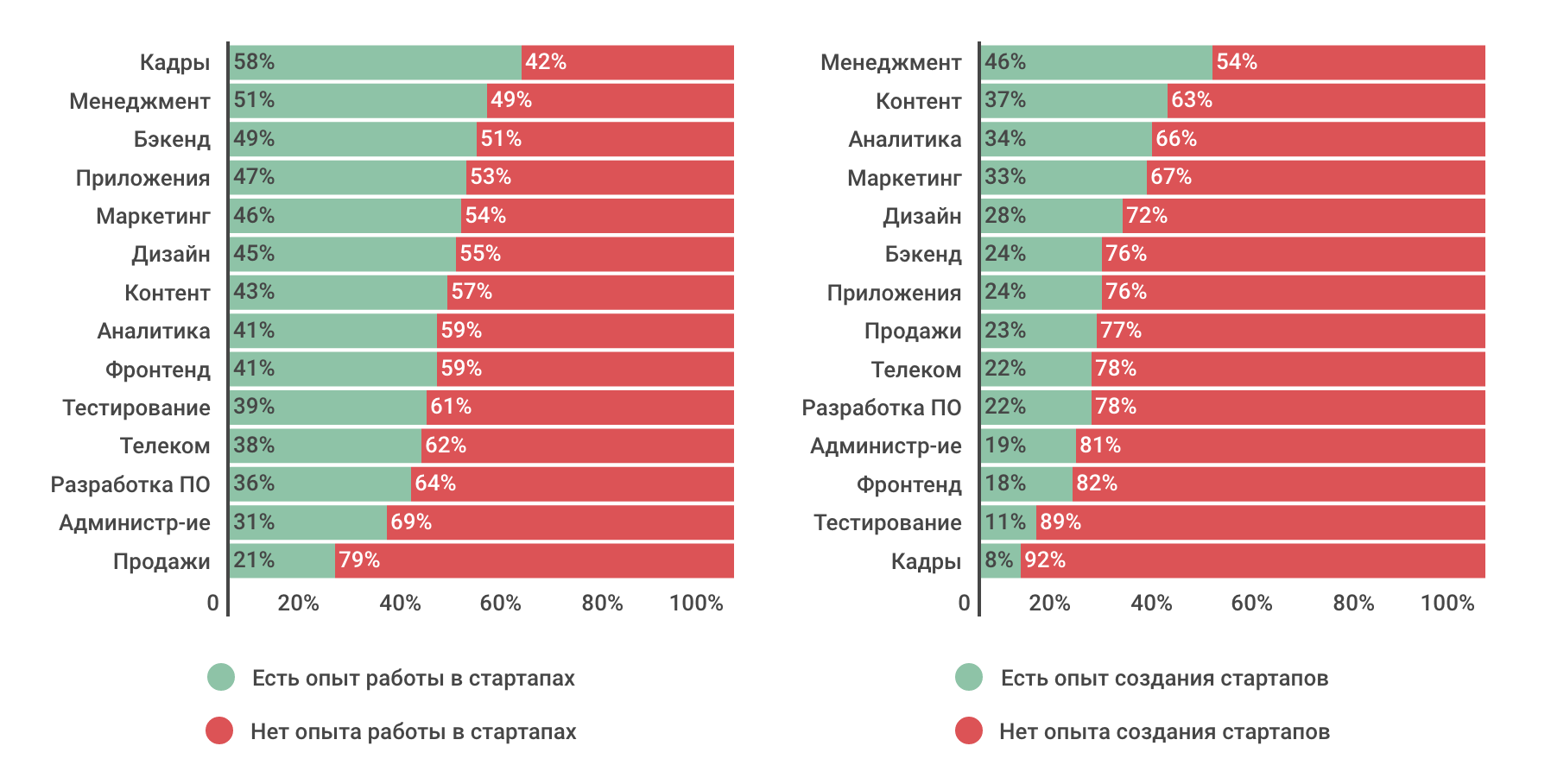
It is interesting to see in which cities IT specialists are more often involved in startups, and in which less often. We took for analysis only the largest in the number of those who indicated their city in the survey. And they found out that the experience of both the employee and the founder of the startup is most often indicated by the citizens of Nizhny Novgorod, and least of all by the people of Novosibirsk. It's funny that among Kazan citizens there is a greatly increased percentage of specialists with employee experience, but extremely low - with the experience of the founder of startups.
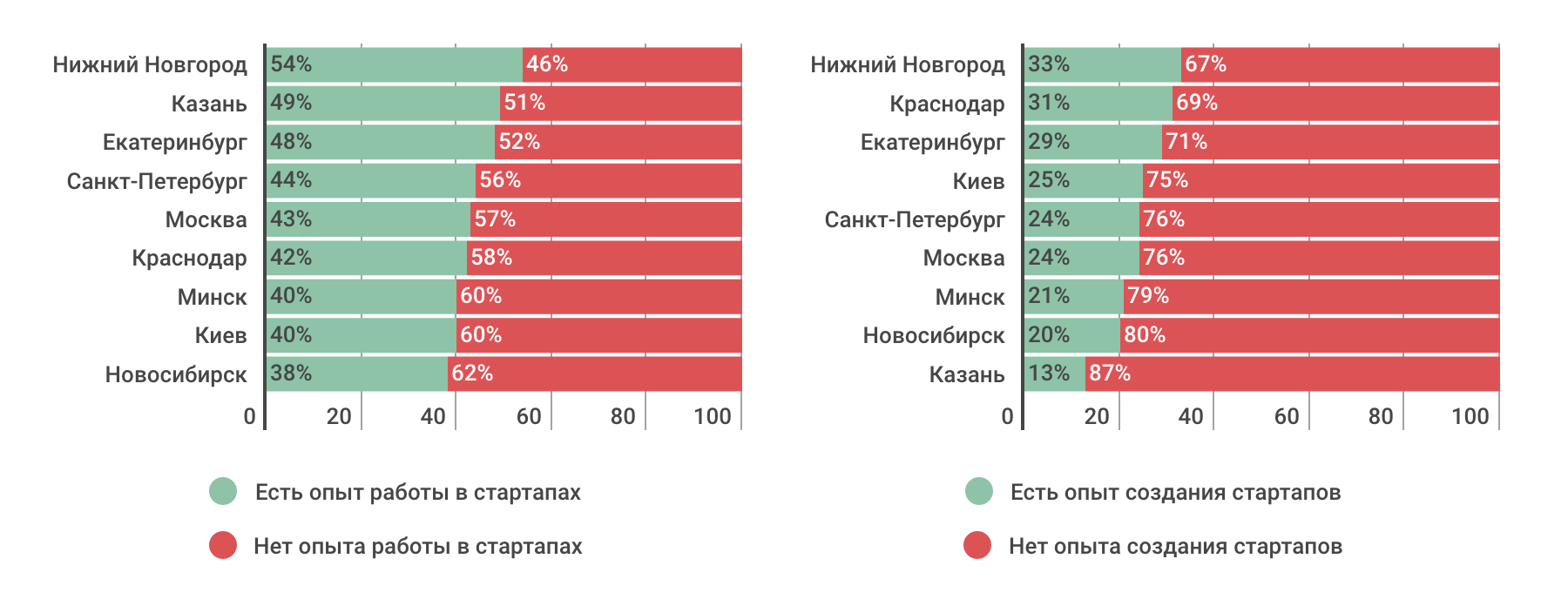
Where did you come to your first startup?
Most of the employees are recruited into startups from commercial companies, and this is natural, since they account for more than half of their jobs among IT professionals. But if we recall the relative distribution of jobs for IT professionals, we will see that freelancers and university graduates are more likely to try themselves for the first time in a startup. Less inclined to go to an employee in a startup specialists who have already had their own business.
If we look at where the creators of startups come from, we will see that, as before, more than others, those who work in a small private company tend to create their own startups. But those who work in a large private company tend to this much less often. Relatively more often, for the first time university graduates try to create their first start-ups. Freelancers and those who already had their own business are also more prone to their first startups.
On the left - answers with the experience of employees, on the right - with the experience of the creators of startups.
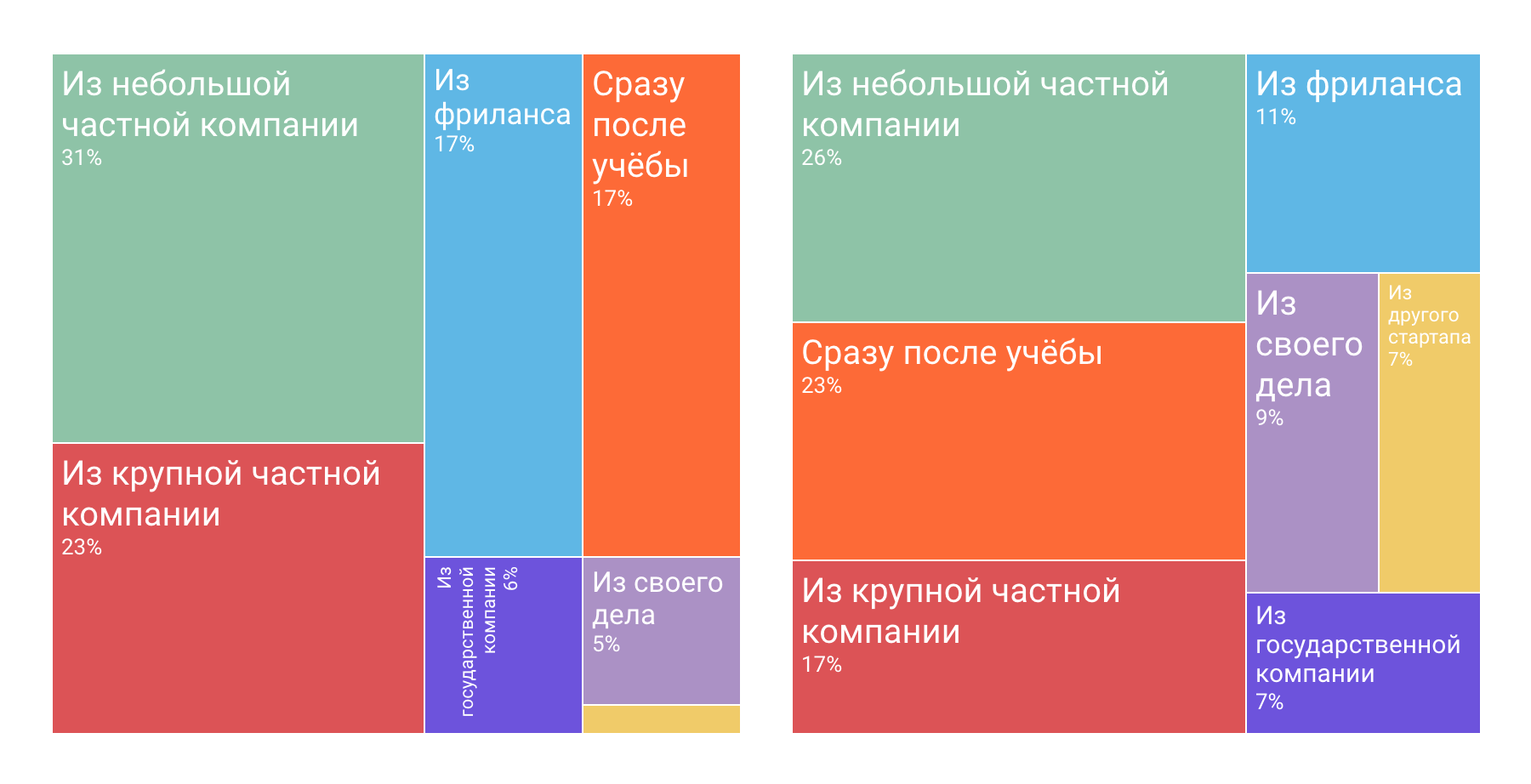
At what age did you come to your first startup?
If today the average age of an IT specialist is 28 years old, as we saw earlier, then for the first time they try to work in startups at the age of 24, and for the first time they try to create it at the age of 25 years. Half of people do it at the age of 21-28.

Alexandra Tomashevskaya , Head of Cofoundit Service:
- It is interesting that the average age of the founders of startups, selected in the on-site Accelerator of IIDF - those who managed to make a product, achieve first sales and put together a team - is somewhat higher: 30 years. So the data only confirms the conventional wisdom: before you make one successful startup, you will kill three.
How many startups did you work as an employee, and how many were created as a founder? How much time spent on this?
For half or even more, work experience or creation experience is associated with a single startup. At the same time, among the employees, compared with the founders, a little more than those who have experience of two or less than three startups.
Startup employees and their creators spend about the same total time working on startups. At the same time, among the creators, compared with the employees, a little more than those who have been involved in startups for more than five years.

What areas were the startups in which you worked as an employee and as a founder?
Founders of startups, in comparison with employees of startups, talk more often about the experience of projects in such areas as: news portals and services for everyday life. And less often - in such areas as: business solutions, financial technologies and social networks.

2. Your most interesting startup: comparing the experience of the employee and the creator of a startup
In this block of questions, we asked those who had the experience of an employee or creator, to recall the most interesting startup in which he had the opportunity to work.
We found that employees more often work in larger startups, and the founders often create smaller ones. Most of the startups in which they work or who create are focused on Russia and belong to the B2B or B2C market.
The creators of startups devote much less time to their project than the employees of the project in which they work. At the same time, employees receive quite a regular salary, but the founders practically work for free.
Startup employees generally rate their experience of participation in startups more positively than their founders. At the same time, both those and others quite equally evaluate the benefits of their experience for career growth.
Does the most interesting startup work for you now, and how many people worked in it?
Startup employees more often than founders say that the most interesting startup in which they participated is still active. At the same time, quite a few, almost every sixth, do not follow the fate of the project with which they were associated, and do not know about its current state.
Start-up employees are much more likely to work in larger companies than the founders do. Most of them, namely a third, talk about working in a startup numbering more than 10 people. At the same time, two thirds of the founders create projects in which from 2 to 5 people work. In general, this is not surprising. A startup in the early stages usually has no money for hired employees. All work for free or for a share / option. If the company does not die, it starts to recruit people for a salary somewhere after the 5th person.

What area, type and size of the market is the most interesting startup for you?
When it comes to the most interesting startups, most of the startups in which IT specialists work, or who they create, are designed for Russia, belong to the B2B or B2C market, and are solutions for business.
Founders of startups, as compared to employees of startups, talk more often about the experience of projects designed for the city, and less often about projects designed for Europe or the USA. They also talk a little more about startups in the C2C market and in such areas as: news portals, advertising technologies and games. And a little less about startups in the field of financial technology.


What was the answer for this startup?
The creators of startups are responsible for almost everything in their project: from development to sales. At the same time, startup employees are mainly responsible for their specialization.
On the left - answers with the experience of employees, on the right - with the experience of the creators of startups.

Alexandra Tomashevskaya , Head of Cofoundit Service:
- At first, the founder of a startup simply has to be a kind of universal soldier: develop MVP, invent design and communicate with first customers. But as soon as the first version of the product is ready, there is a need to simultaneously find new customers and develop the product. In order not to lose speed in this case, it is better to focus on what you can do better, and close other competencies to the co-founder. If you’re a cool developer, find a producer - a person with connections in the industry who will take on contacts with customers and first sales. If you are a cool specialist in the industry, find a technical director who will come up with a product architecture and hire a freelance development team.
To learn how to build up a startup team correctly, read the article: biznesmodeli.ru/minimalnaya-komanda-startapa-mvt-i-chisla-fobinachchi
How much time did you spend on this startup and did you combine work in it with another job?
The creators of startups devote much less time to their project than the employees of the project in which they work. Two-thirds of the creators combine work in their startup with other work, while only a third of employees do it.

Alexandra Tomashevskaya , Head of Cofoundit Service:
- Before the team applies for investments, many co-founders work on the project in part-time mode, and this is normal. But in order to convince investors that you are 100% committed to the product and are ready to develop the product as quickly as possible, at least two people must be fully involved in the project.
Therefore, there is nothing terrible if at first you take a developer or a marketer who is ready to work only 10 hours a week. But you need to immediately agree (and even better - to register in the partnership agreement), under what conditions your employee will go into the project for full employment. If he is not ready to do this at all, then it is worth considering whether your project is interesting to him.
What was your salary in this startup?
For employees of start-ups, their work remuneration is almost the same as in the entire IT market: the level of income earned is distributed into three more or less equal segments. Although every tenth among them noted that he did not have a salary at all, which is unacceptable for an ordinary company. For most startups, their work in a startup is not at all like a regular job: more than half say that they do not have wages in their enterprises at all.
It becomes clear why the creators devote less time to their work in a startup and combine this work with another: they just have to do it in order to earn a living.
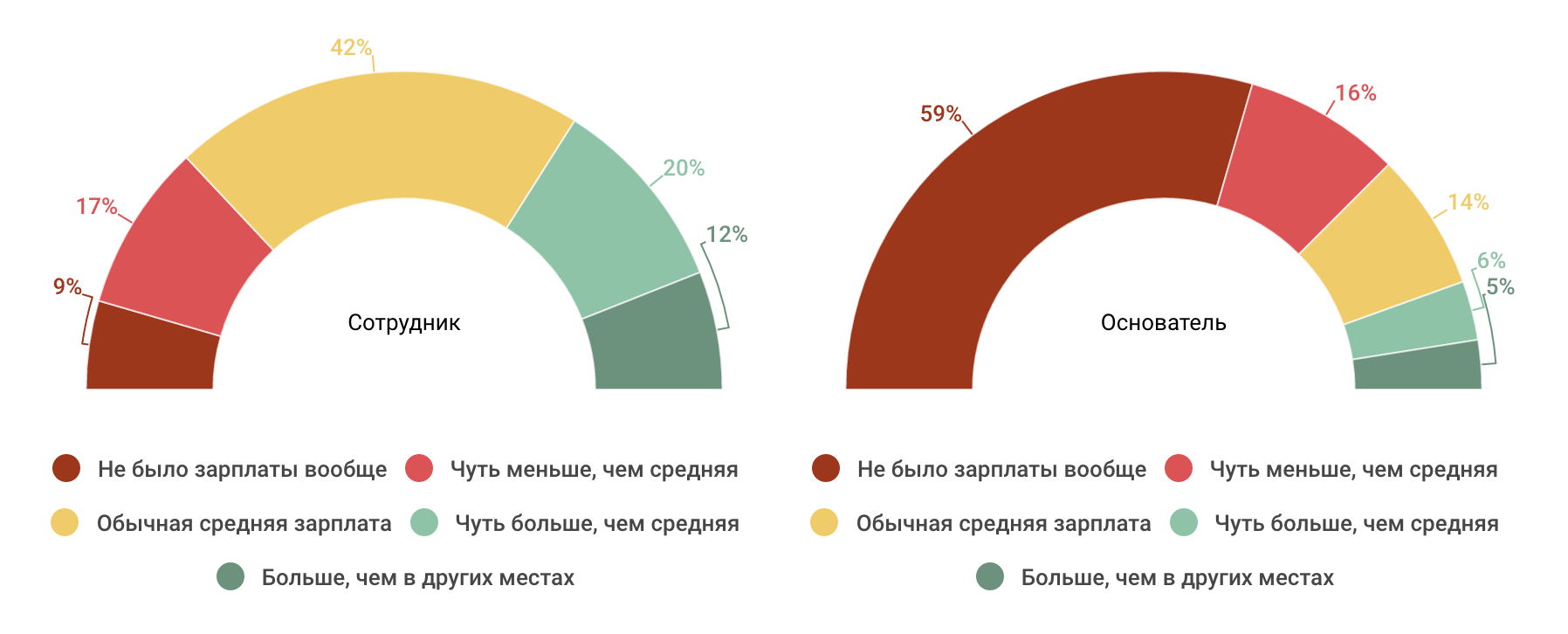
As an employee, was you offered a share in this startup, and if so, which one? How did the founder have your share legally secured and what was your share?
Almost every third startup employee is offered a stake in the company: most often 5 or 10%, but there are also quite a few other options. The founders have a fairly small spread of shares for them: as a rule, this is 100 or 50%, much less often 30%, other options are rare. This can be explained by the fact that more often companies are created by no more than 1-2 people who are also its first employees.
On the left - answers with the experience of employees, on the right - with the experience of the creators of startups.

Alexandra Tomashevskaya , Head of Cofoundit Service:
- Unfortunately, the statistics of law: the vast majority of startups do not enter into an option agreement with their employees. This is partly due to the fact that the relevant rules are not fully spelled out in our legislation - or the founders do not quite know how to use them. In addition, often co-founders in a startup take friends with whom it is not customary to sign formal agreements. And it’s in vain: we had examples when the team was approved for on-site Accelerator, and when the question of how the shares were divided became more relevant, the participants quarreled, the team broke up. And another factor that is fair in those cases when employees join the startup in the early stages: they do not fully believe that the startup will live long enough to make a profit, and do not insist on formalizing its share in the company.
Another problem with the distribution of shares in a startup is related to the incorrect distribution of shares among team members. Most often, the shares are divided equally. This is normal at an early stage, while a startup does not make money. But then the co-founders understand that all employees have different contributions - by the time spent, by the utility, by the share capital, by the connections that were involved. This leads to the fact that the share has to be reviewed, or the team splits.
On how to properly share the shares, read Mike Moyer’s book “Slicing the pie handbook”, I highly recommend it.
How do you rate your experience of participation in startups?
Startup employees generally rate their experience of participation in startups more positively than their founders. At the same time, they quite equally assess the value of their experience for career growth. But for professional and especially personal growth, the creators see much more benefit from their experience.
On the left - answers with the experience of employees, on the right - with the experience of the creators of startups.
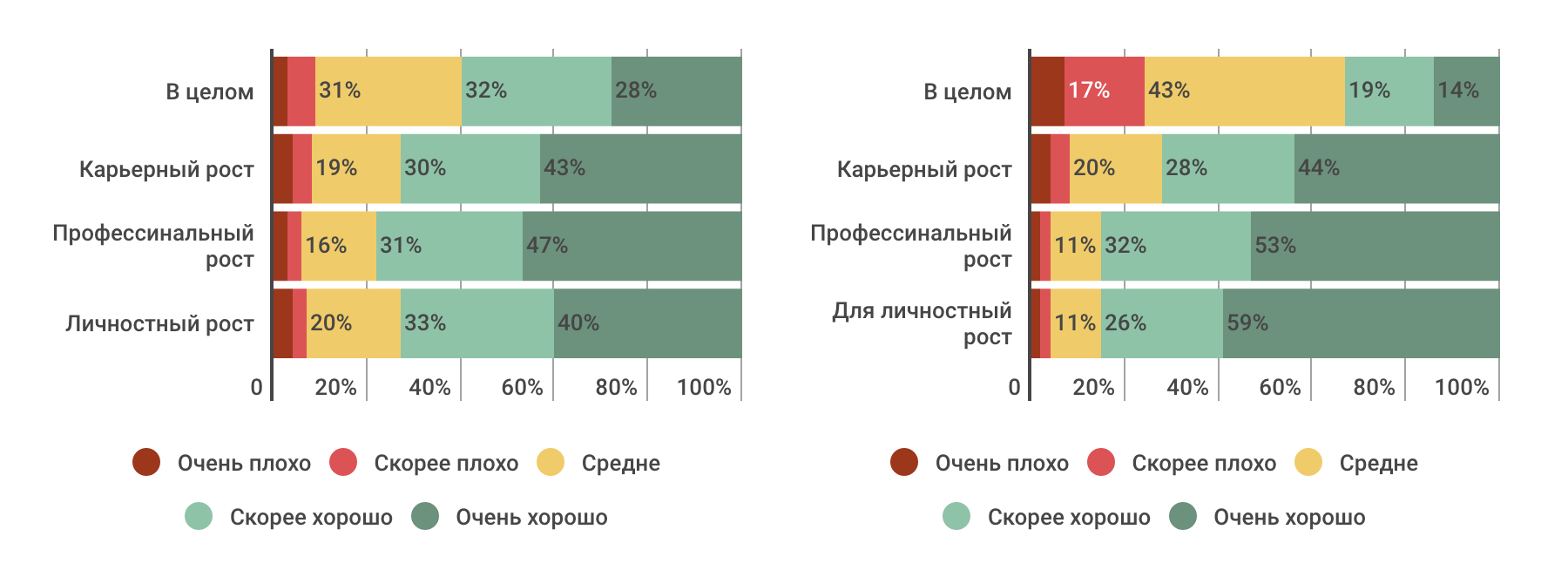
It is interesting to calculate how much those who have had the experience of a startup employee or creator now earn. In the following calculation, we did not take into account those who said that they are working in a startup at the moment, such, we recall, about 10%. As we see, the higher the current salary, the more likely it is that the specialist had previous experience of a startup employee. The former creators of startups are getting harder: most of them have the highest salary levels, in the rest of the salary ranges, former startups are much less frequent.
On the left - the answers of former employees, on the right - the former founders of startups.
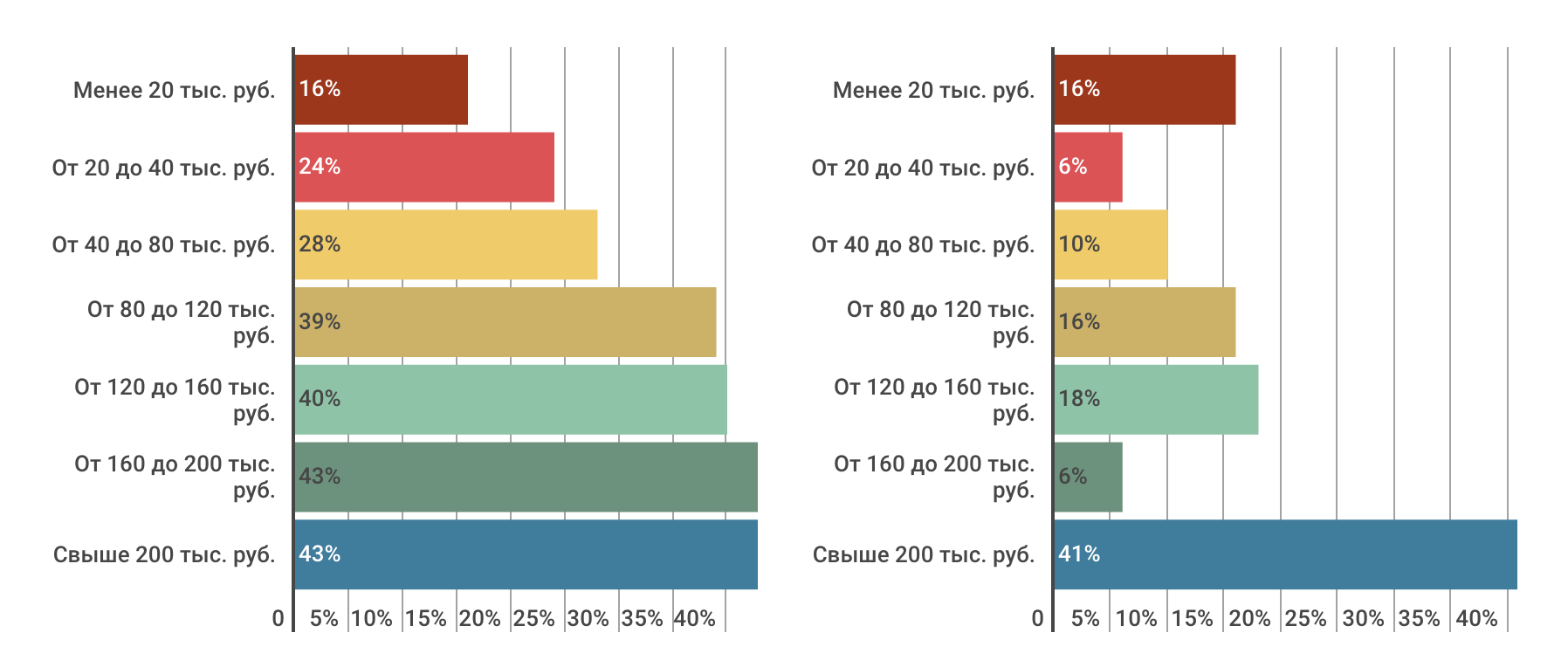
3. A few additional questions to founders of startups.
In this block of questions, we clarified a few points related to investments and monetization from those who had experience in creating their own startup.
We found out that only a third of startups manage to monetize, most often this happens in six months, less often in a year or two, and the most popular way to monetize is subscription.
Investment attracts only every fifth startup, while more often than any other source of investment are funds from friends or their own.
Could you benefit from owning a share of a startup and if so, which one?
Slightly more than a third of the founders were able to benefit from the ownership of their company. For most, this benefit is not material: it is gaining experience and the ability to manage a project. Every fourth could receive dividends from the share, every sixth could sell the share.

What type of monetization was chosen for a startup?
Curiously, a subscription to services or content ranked first among the ways to monetize. And indeed, from personal experience, everyone can judge: what was previously bought once and for all, is now increasingly being sold by subscription.

Did your team manage to monetize this startup, and if so, how long did it take to break even?
Almost a third of entrepreneurs were able to monetize their project. Interestingly, almost half of them managed to do it in less than six months. Every fifth in a year. Every sixth in two years.

Has this startup attracted investment, and if so, what type of investment did it attract?
Only every fifth project attracted investment: most of these investments were from friends or their own.
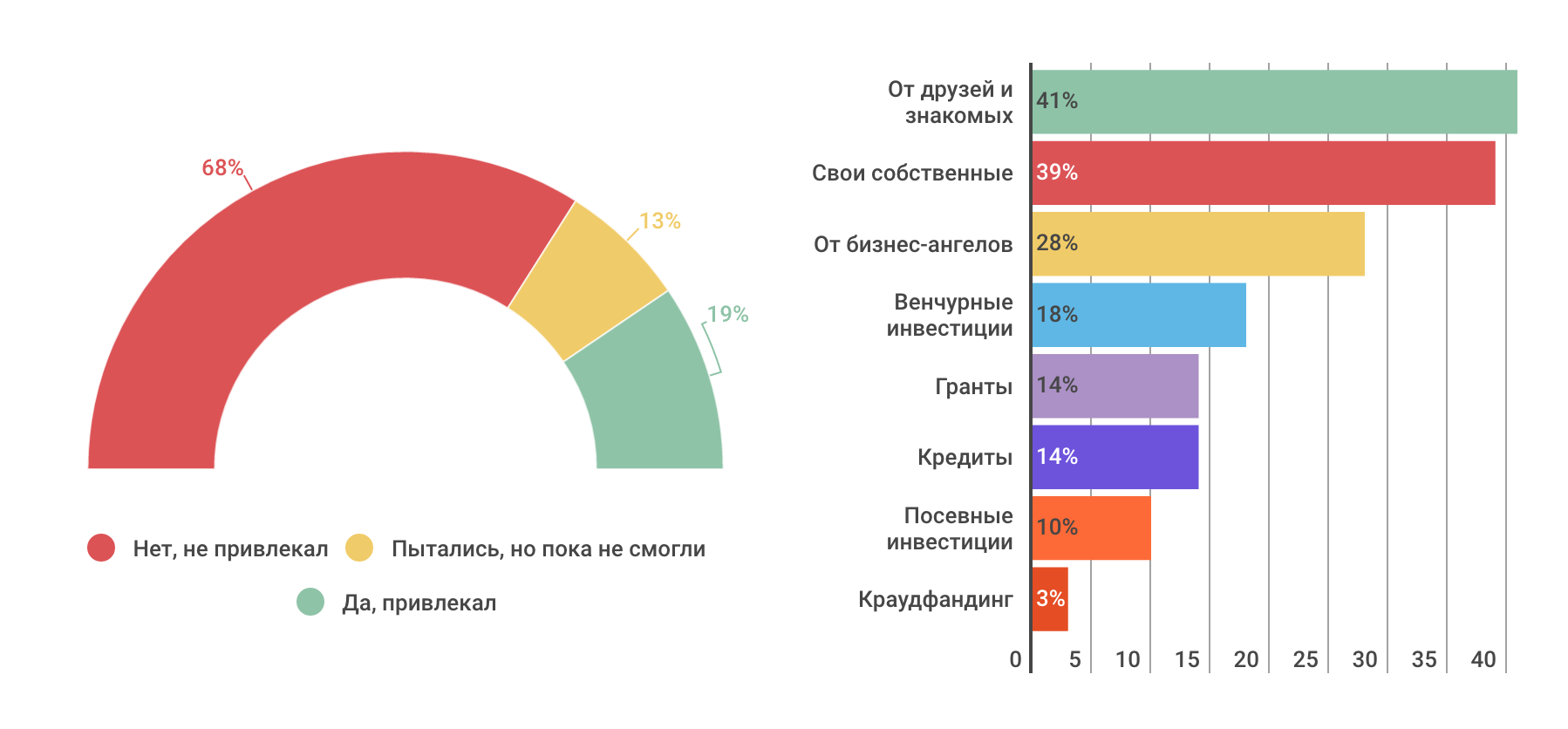
Did you search for a co-founder in this startup and if you were looking, then what competence did you want to close?
Every third founder was looking for a co-founder. At the same time, he tried to close the competencies, primarily related to sales and promotion of the project.
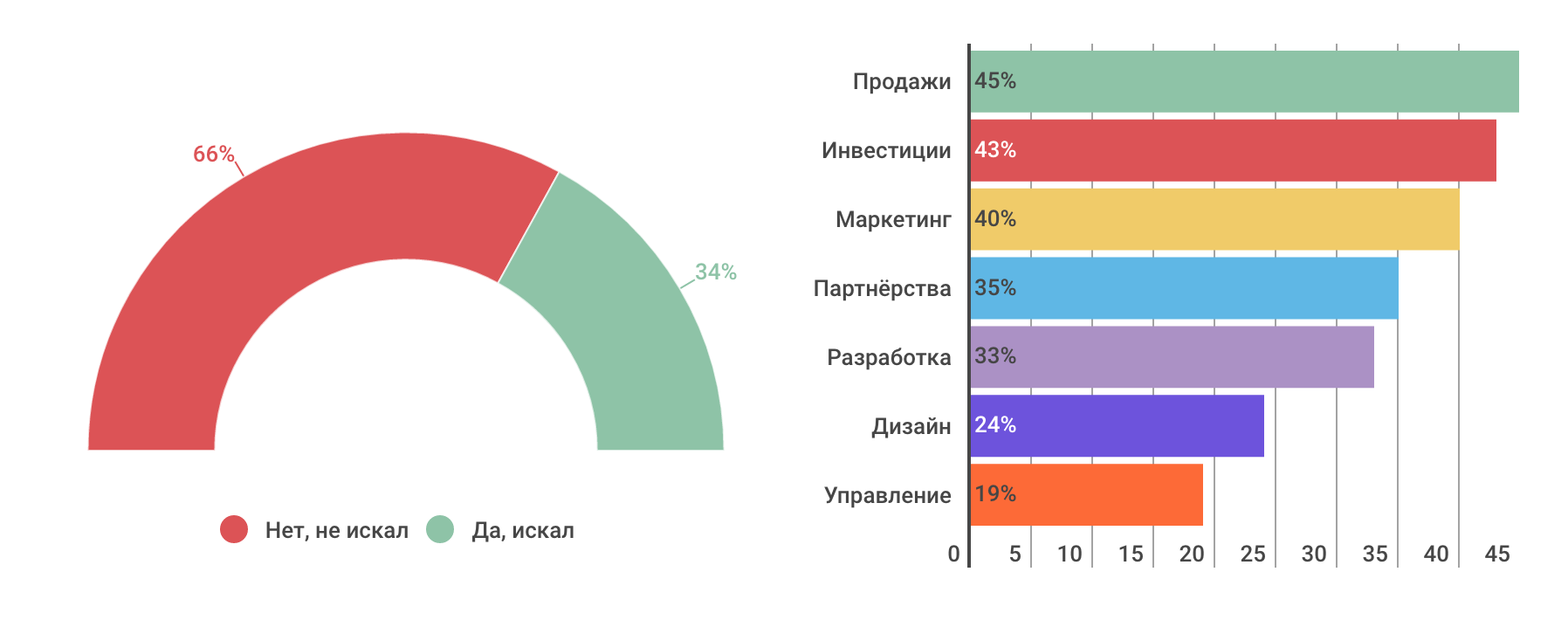
4. How much are you interested in startups: what motivates and what stops?
In conclusion, we asked those who have never had a startup experience, that they can be motivated to acquire such experience, and that, on the contrary, it stops.
Are you considering the opportunity to go work as an employee in a startup? Are you going to create your own startup?
Two thirds of those who have never worked as an employee in startups are considering the possibility of going there to work. Every seventh, however, does not consider such a possibility.
More than one-third of those who have never created their own startups plan to do this. Every fifth, at the same time, does not plan. Most of them find it difficult to answer.
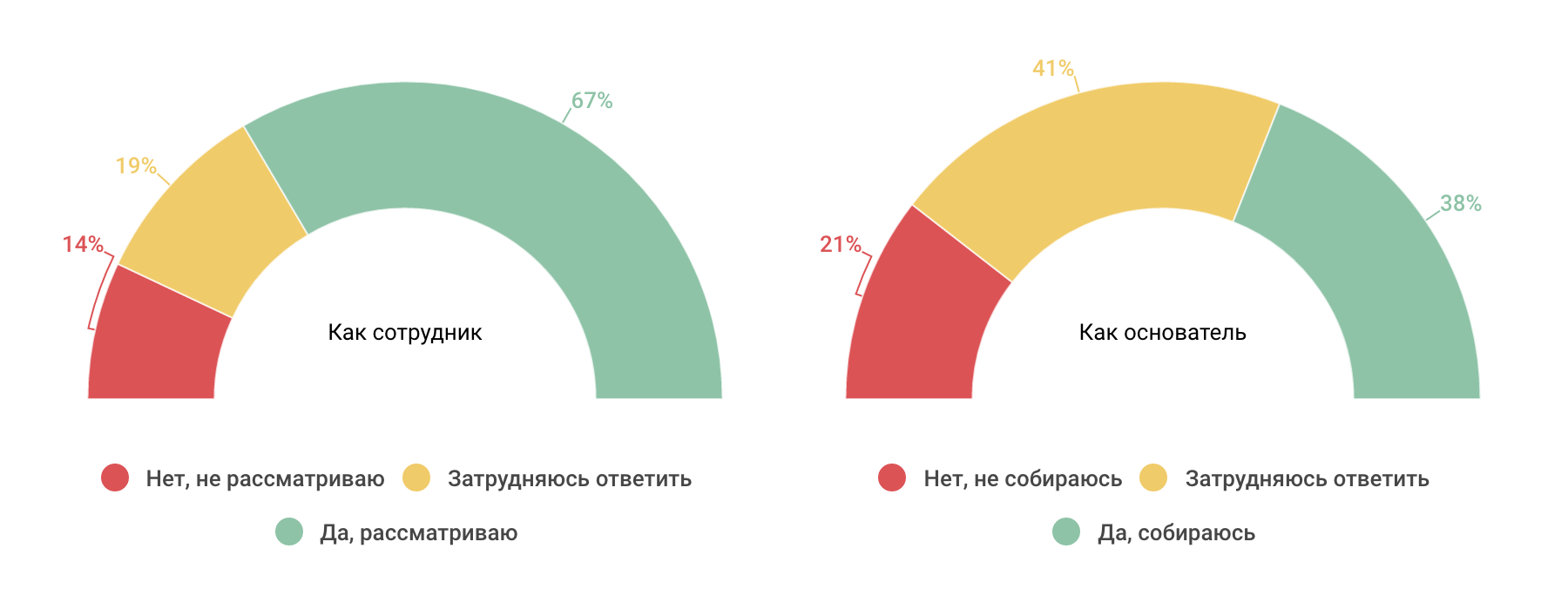
What can make you go to a startup employee? What can you encourage to create your startup?
Both potential employees and potential founders of startups are most motivated by a good project idea. Almost four out of five talk about it. And least of all, those and others are motivated by the prospect of entering the world market. However, every third person speaks about this.
Interestingly, a good salary is much more important for future start-up employees than a good share in the project. It is also curious that a good team is more important for the future creators of startups than the possibility of investment.
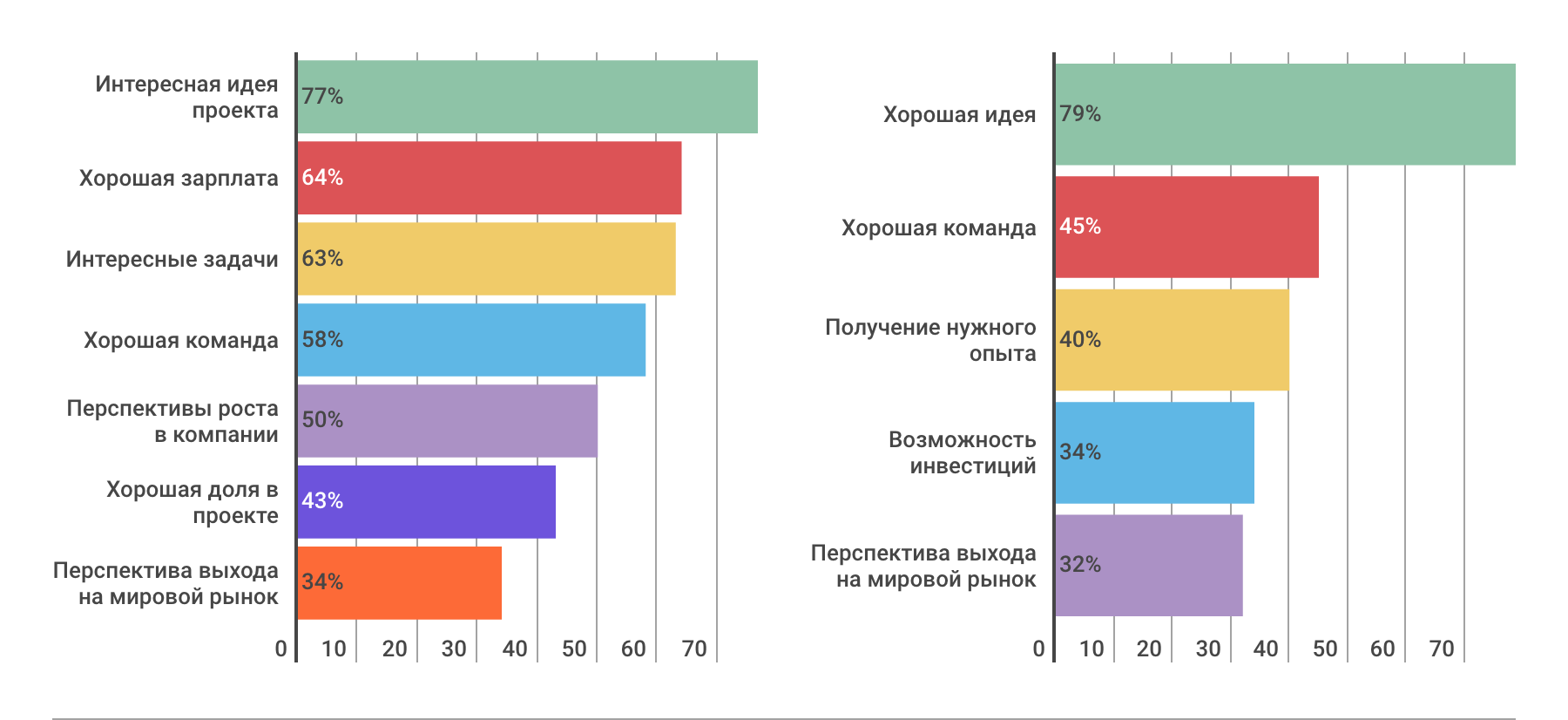
What stops you from going to a startup employee? What stops you from creating your startup?
Potential employees of startups are most of all stopped by the lack of a steady and stable income. Equally important for them is also a good idea and a good team. This says every second or more. The potential creators of startups are most of all stopped by, again, the lack of a good idea. As well as the lack of a penchant for entrepreneurship. Almost every second person speaks about this.
Difficulties of career and professional growth least of all stop future employees and founders of startups. A little higher we got an explanation for this: for most of those, and others, a startup on the contrary gives impetus to both career and professional growth.
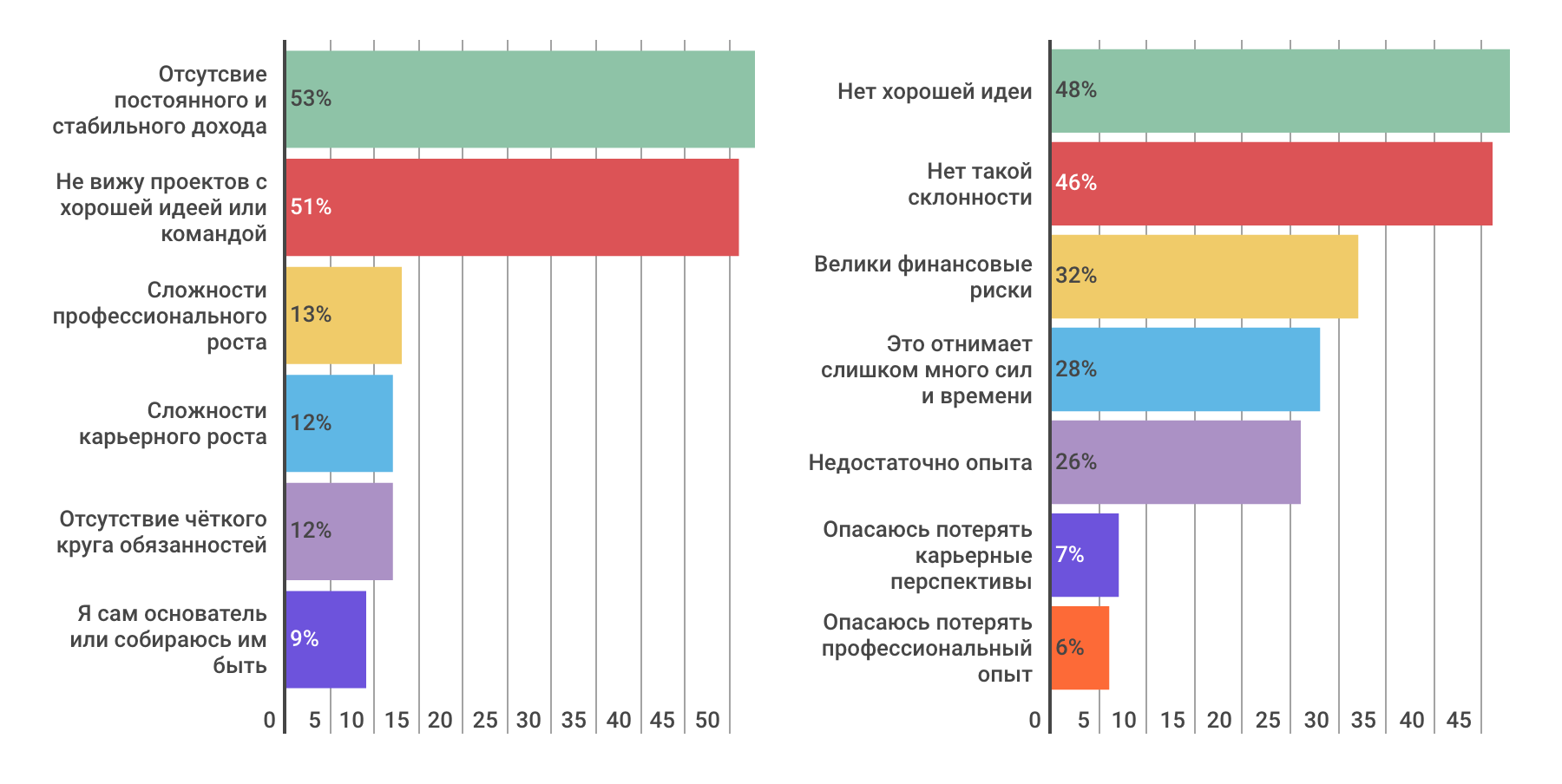
Alexandra Tomashevskaya , Head of Cofoundit Service:
- In my opinion, this is a very important insight for startups who are looking for employees.
Frequently, project founders come to us with a classic question: “We have been looking for an employee for three months already. Why does nobody want to work with us? ” To convince a cool expert to work in a startup, you need:
- Explain clearly the essence of the project, what problem you are solving and what are your best competitors. This is the first step to ensure that your future employees believe that the project will take off.
- Explain exactly what tasks the future employee will have to solve, so that he understands what his development will be. No "difficult and interesting tasks" - just specifics!
- Explain what unique competencies or experience your team has, why it would be useful for a prospective employee to work with you. For example, if you were selected to attend the IIDF Accelerator - write about it! This will give candidates confidence in your project.
All charts are prepared using the service infogr.am .
Source: https://habr.com/ru/post/313756/
All Articles